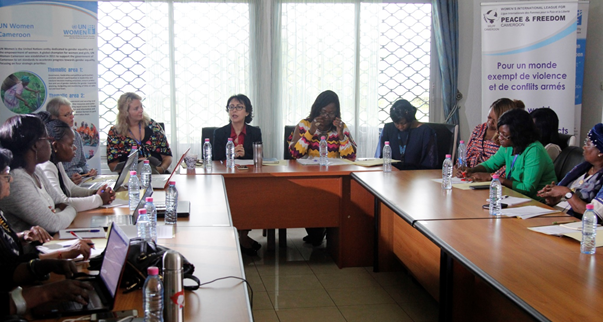WILPF Cameroon and FIRE Consortium present their gender conflict analysis project to UN Women and other international stakeholders
Date:

On 27 September 2019 the Women’s International League for Peace and Freedom (WILPF) Cameroon organized a briefing meeting with 22 participants from UN agencies and other experts on women, peace and security issues to present their recently launched gender conflict analysis project and discuss their objectives on the dialogue process launched by the Government of Cameroon. The meeting, which took place in the UN Women Yaoundé office, sought to present the activities of the FIRE Consortium to analyze the dynamics of the Cameroon conflicts from a gender perspective and gather input from the international actors on sustainable solutions to the various crises underway in Cameroon.
In her welcome address to participants, Hind Jalal, Deputy Representative of UN Women Cameroon outlined the challenges faced by women affected by conflicts in Cameroon: “Women in the conflict regions have denounced the harassment and threats they face as a result of the crises. Prostitution and early marriage have become negative coping strategies for displaced women and girls, many of whom are increasingly subjected to sexual violence, abuse and exploitation” she regrets. Ms. Jalal praised WILPF’s initiative especially during this period when the government in preparing for National Dialogue. UN Women also used the opportunity of this meeting to reaffirm its commitment to promote the effective participation of women in conflict resolution and peace building.
Sylvie Ndongmo, President of WILPF Cameroon, whilst presenting the gender conflict analysis project recalled the recommendations of the UN Resolution 1325 on women, peace and security and the 1325 National Action Plan for Cameroon which call for the participation of women in peace building processes. The international members of the FIRE Consortium from the Democratic Republic of Congo, Germany, Kenya, Northern Cyprus and South Africa shared their experiences and lessons of dialogue processes they witnessed.